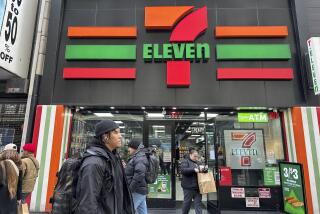Shuwa Ruling Poses Challenge to Way Business Is Done in Japan
- Share via
TOKYO — A Japanese real estate giant with substantial holdings in the United States has rattled the corporate establishment at home, challenging an entrenched system of crossed share holdings in a hostile takeover bid that may help open Japan’s financial markets to foreign investors.
Shuwa Corp., which owns Arco Plaza in Los Angeles and more than 30 other buildings in the United States, has caused a minor sensation here by accumulating large stakes in two regional supermarket chains and talking boldly about combining their operations into one large and efficient retailing concern--against the wishes of the companies’ managers.
Such a gambit might seem commonplace in the United States, but in Japan most companies guard against hostile takeovers by placing blocks of stock in the hands of friendly, “stable” investors. The game of mergers and acquisitions is usually played in the shadows by unsavory characters.
Shareholders as Owners
When takeover activity does come out into the open, it invariably involves some form of “greenmail”--the practice in which a takeover target pays a potential acquirer, usually by buying back acquired shares at a premium, in return for the other’s promise not to pursue the takeover bid.
Shuwa’s high-profile bid for controlling interests in Chujitsuya Co. and Inageya Co. was given a boost Tuesday by the Tokyo District Court, which prohibited the two retailers from swapping new issues of heavily discounted stock in a takeover defense intended to dilute Shuwa’s holdings.
It was not immediately clear what kind of legal precedent the ruling would set, or whether it might contribute to Japan’s industrial restructuring and help reform the rigid and exclusive web of corporate cross-holdings, a system that has its origins in the pre-World War II zaibatsu conglomerates.
But by ruling that the companies should have obtained approval at general shareholder meetings before planning the stock swap, the court backed Shuwa’s contention that shareholders are the ultimate owners of publicly held companies. Traditionally, ordinary shareholders wield little or no influence over management activities in Japan’s corporate culture.
T. Boone Pickens Jr., an American corporate raider, said the court’s decision “represents a strong step toward breaking down the anti-investment barriers erected by Japan’s cartels.”
Pickens is battling for representation on the board of a Tokyo company--which makes automobile headlights and other parts--in which he purchased a 20% stake earlier this year.
“Even the Japanese courts are now deciding that Japan Inc. cannot ignore the rights of its shareholders,” Pickens said in a statement issued at the Amarillo, Tex., office of his Boone Co. investment partnership. “This ruling is an important step in our efforts to remove barriers and open up Japan to shareholder rights and foreign investment.”
Kanji Ishizumi, a Tokyo lawyer specializing in mergers and acquisitions, said the judgment “backs up what Mr. Pickens has been saying” about shareholder democracy.
“Things will definitely change from now; they have to,” Ishizumi said. “Japanese can buy U.S. companies freely, but the reverse isn’t true because cross-holdings among friendly shareholders in Japan make it impossible to acquire a majority.”
Shigeru Kobayashi, Shuwa’s president, assembled holdings of 33% and 21%, respectively, in Chujitsuya and Inageya, buying shares on the open market over a two-year period to become the top shareholder in each of the family controlled companies. He also obtained stock in three other retailers, including one run by an old friend with whom he planned to cooperate in merging and operating the business once the acquisitions were complete.
Streamlining the System
Kobayashi, whose aggressive real estate acquisitions in the United States coincided with rising uneasiness over Japanese “investment friction,” then adopted a cause seemingly designed to generate good will. He said he wanted to do his part to streamline the complicated and inefficient distribution system, which has been widely blamed in recent years for restricting imports.
“We plan to restructure the general merchandise distribution industry,” Kobayashi said. “People will see that what we are doing is right, after seeing the results.”
On the advice of Nomura Wasserstein Perella Co., a Tokyo-based joint venture between Japan’s largest brokerage and a New York investment bank, Chujitsuya and Inageya announced July 10 a plan to expand their cross-holdings to 19.5% by trading issues of new stock, discounted by as much as 78% below market prices.
Kobayashi sued for a court injunction against the offering, and this led to Tuesday’s ruling.
The two supermarket chains “won’t fight beyond this” for the stock swap, said Mitsuo Goto, president of Nomura Wasserstein. “But they will pursue business ties between the two companies and oppose any outside interference in the management.”
Although Kobayashi has hinted at the possibility of selling off his shares to major national retail chains, such as Seibu/Saison Group or Daiei Inc., his strategy from now on is not clear, nor is it certain that he can continue to buy shares on the open market.
“Regardless of who is the winner or loser, I think that the Shuwa case will be a positive factor in vitalizing the Japanese securities market,” Rinichi Kanzaki, an investment consultant, said in a television interview. “Japanese companies cannot live in an environment of peace and quiet forever.”
SHUWA HOLDINGS
Shuwa Investments Corp., the U.S. subsidiary of Shuwa Corp. of Tokyo, owns 35 properties in the United States valued at $2.7 billion. Some of the key properties are:Arco Plaza, Los Angeles
1900 Avenue of the Stars, Century City
Chase Plaza, Los Angeles
19000 MacArthur Building, Irvine
Taco Bell Building, New York
ABC Building, New York
Mellon Financial Center, New York
U.S. News & World Report Building, Washington D.C.
Embassy Suites Hotel, Washington D.C.
Paine Webber Building, Boston
Quaker Tower, Chicago
Source: Shuwa Investments Corp.
More to Read
Inside the business of entertainment
The Wide Shot brings you news, analysis and insights on everything from streaming wars to production — and what it all means for the future.
You may occasionally receive promotional content from the Los Angeles Times.










